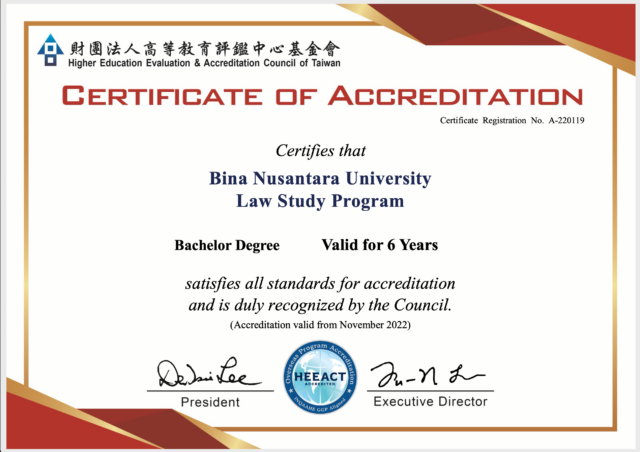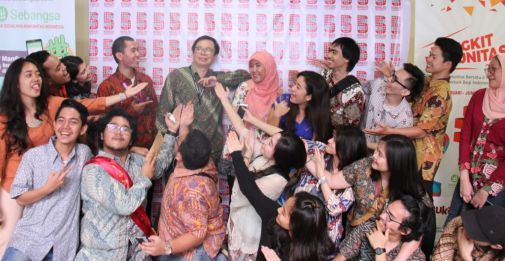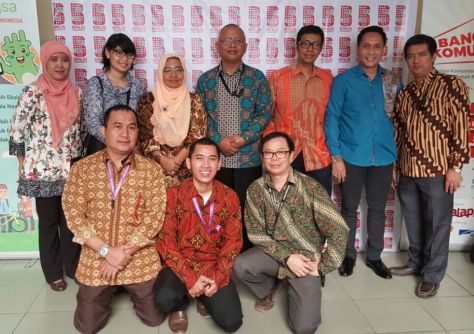For Academic Year 2016/2017 up to 2019/2020
Accreditation update:
Law Study Program of BINUS is internationally accredited by HEEACT and BAN-PT accreditation of the Ministry of Research and Higher Education of the Republic of Indonesia, with the predicate: “Unggul” (excellent).
The explanation below is valid for student intakes from the academic year 2016/2017 up to 2019/2020
BUSINESS LAW (BL) PROGRAM
BINUS BL S-1 Academic Program offers a wide selection of law courses. The curriculum is specially designed to assist our law students in planning their interests in studying business law in Indonesia as well as in global arenas.
The legal science structure taught in this program is divided into several topical categories called course clusters. Each course cluster consists of several courses, but certain courses may be associated with more than one-course clusters. Every single course cluster is managed by one qualified expert called SUBJECT CONTENT COORDINATOR. The expert is assisted by one or more SUBJECT CONTENT SPECIALISTS.
- FUNDAMENTALS OF LAW
A set of subject matters which is designed to give students with sufficient understanding of legal principles. These subject matters are very essential components of students’ knowledge in learning legal science. They provide students with underlying bases for grasping more specific knowledge and skills in terms of business law.
- FUNDAMENTALS OF BUSINESS LAW
A specified formation of law that consists of theoretic and dogmatic legal science, especially in business contexts, composed for supporting students’ comprehension on international trade & commerce law (ITC Law) and information & communication technology law (ICT Law). The term “Business Law” is used here underpinning the core or concentration of BINUS BL Department.
- INTERNATIONAL TRADE & COMMERCE LAW (ITC Law)
ITC Law is one of two subtopic areas of business law offered in BL program. It is an exciting comprehension series that provides full coverage of basic skills needed in analyzing legal problems in international business transactions.
- INFORMATION & COMMUNICATION TECHNOLOGY LAW (ICT Law)
ICT Law is another subtopic area of business law offered in BL program. It is also an interesting series that provides basic skills needed in addressing legal problems related to the application of ICT in business activities.
For the 2014 intake, besides some courses centrally organized by university like English and Character Building, BUSINESS LAW PROGRAM provides students with newly restructured and selected courses as follows:
Theory of State (ilmu negara)focuses on comprehensive insights and views the basic ideas of state and to prepare students in learning other courses related to state, such as constitutional law, administrative law, and international law. Topics: Notion of state, elements of the state, type of state, objectives of state, functions of a state, pillars of government, state and constitution, the concept of sovereignty, interstate collaboration. |
Credit 2 |
Introduction to Jurisprudence (Pengantar Ilmu Hukum)introduces students to the fundamentals of law as an important foundation for students to take any other courses in the following semesters. Topics: Notion of law, the legal system, legal discipline, legal objectives, legal sources, branches of law, parents legal system, legal principles. |
4 |
Introduction to Indonesian Legal System (Pengantar Hukum Indonesia)is a general study of the Indonesian legal system as an important foundation for students to review the Indonesian positive law. Topics: Elements of Indonesian legal system, historical backgrounds of Indonesian legal system, Indonesian legal codifications, legal pluralism, legal sources and hierarchy in Indonesian positive law, application of legal principles in Indonesian positive law. |
4 |
Empirical Legal Sciences (Ilmu-Ilmu Empiris tentang Hukum)provides the constellation of legal discipline in broader scope that includes branches of empirical sciences and how those sciences contribute their analyses in enriching the study of dogmatic legal science. Topics: The general overview and importance of sociology of law, anthropology of law, politics of law, history of law, comparative law, criminology, and legal semiotics. |
4 |
Islamic Law (Hukum Islam)is designed to provide students with a deeper understanding of the position of Islamic law and its contribution to developing the Indonesian legal system. Topics: Elements of Islamic law, historical backgrounds of Islamic law in Indonesia, Islamic legal sources, schools of Islamic law, religious court and its function to address certain legal issues. |
2 |
Constitutional Law (Hukum Tata Negara)examines the interaction among elements of states and the relationship between state and its citizens. Topics: Separation and division of power theories and their application in certain states, state organization, human rights, judicial review, position and function of Constitutional Court, procedural law of the Indonesian Constitutional Court. |
4 |
Private Law (Hukum Perdata)explains the legal principles of private law in general as well as those of Indonesian private law in particular. Topics: Notion of private law, characteristics of private law, legal sources of private law, the regulation of private law in Indonesia, personal and family law, property law, contract law, inheritance law, and connection between private law and business activities. |
4 |
Criminal Law (Hukum Pidana)focuses on the legal principles of criminal law in general as well as those of Indonesian criminal law in particular. Topics: Notion of criminal law, characteristics of criminal law, types of criminal action, crimes as regulated inside and outside the Indonesian Criminal Code, legal sources of criminal law, the regulation of criminal law in Indonesia, material aspects of crime, and connection between criminal law and business activities. |
4 |
International Law (Hukum Internasional)offers a critical examination of the legal principles of [public] international law as mentioned in doctrines, applied in customs, and regulated in international conventions. Topics: Notion of international law, characteristics of international law, legal sources of international law, legal subjects in international law, important international agreements/conventions, and connection between [public] international law and business activities. |
4 |
Administrative Law (Hukum Adminstrasi Negara)studies the legal principles of administrative law in general as well as those of Indonesian administrative law in particular. Topics: Notion of administrative law, characteristics of administrative law, legal sources of administrative law, legal subjects in administrative law, good governance, public policy, local government, and connection between administrative law and business activities. |
2 |
Procedural Law (Hukum Acara)trains students to implement the principles of procedural laws addressing private, criminal, and administrative legal problems in their respective courtroom. Topics: legal standing, legal jurisdiction, law of evidence, legal documents, procedural actions in the courtroom, and role-playing in moot court. |
6 |
Adat & Agrarian Law (Hukum Adat dan Agraria)explores and evaluates the existence and functions of adat (traditional customary) law in the Indonesian legal system, especially as the basis of agrarian law; and the application of agrarian legal principles and norms in the context of contemporary situation in Indonesia. Topics: Notions of adat and agrarian law, elements of adat law, characteristics of adat law, connection between adat and agrarian law, historical backgrounds of agrarian law, principles of agrarian law, subjects of agrarian law, entitlement, land tenure, land procurement, and connection between agrarian law and business activities. |
2 |
Principles of Business Law (Dasar-Dasar Hukum Bisnis)analyzes the legal principles of business/trade/commercial laws in general as well as those applied in Indonesian positive laws in particular. Topics: notions, legal sources, legal principles of business/trade/commercial laws, fundamentals of the Indonesian Commercial Code, corporate law, commercial paper, insurance law and freight, bankruptcy law. |
4 |
Consumer Protection Law (Hukum Perlindungan Konsumen)explains the rights of consumer and how to protect those rights by using both national and international legal instruments. Topics: Notion of consumer and business actor, legal principles of consumer protection, types of consumer transactions such as in advertising, standardized contract, after-sales services, class action, NGO’s legal standing, citizen-lawsuit, government action, the international consumer. |
2 |
Islamic Business Law (Bisnis Syariah)covers the legal principles of Islamic law applied in current business activities. Topics: Halal and non-halal business concepts in Islam, Islamic banking, takaful and other Islamic finance, Islamic pawnshop, Islamic capital market, baitul maal wa tanwil. |
2 |
Business Competition Law (Hukum Persaingan Usaha)deals with the legal principles of business competition law and how those principles are applied in promoting fair business climate in the market. Topics: Notion of monopoly and monopolistic practice, type of monopoly, dominant position, relevant market, prohibited agreements, per se illegal, rule of reason, prohibited actions, corporate strategies in business, and procedural law in the Business Competition and Supervision Commission. |
2 |
Alternative Business Dispute Resolution (Alternatif Penyelesaian Sengketa)trains students to apply the mechanism on dispute resolution as the alternatives from conventional private procedures in the courtroom. Topics: Notion of ADR, characteristics of ADR, concepts and practices of negotiation, mediation, conciliation, arbitration, and cases that can be settled in ADR mechanism. |
4 |
Investment Law (Hukum Investasi)explains the legal principles of investment law and what kinds of right and obligation the parties have in investment contracts. Topics: Notion of investment, types of investment (direct and indirect investments, foreign and domestic investments), national policies in investment, capital market, and some legal disputes on investment in Indonesia. |
4 |
Banking & Financial Law (Hukum Perbankan dan Keuangan)explores and evaluates the contemporary legal principles of banking and financial law, and how the institutions should be operated according to the law. Topics: Notion of banking and financial law, types of banking and financial institutions, bank and non-bank financing, bank guarantee, leasing, venture capital, factoring, business credit cards, consumer finance institutions, and cases on banking and financial activities. |
2 |
Intellectual Property Rights (Hak Kekayaan Intelektual)examines intellectual property rights (IPR) and how to protect the right holder according to the national law and international conventions on IPR. Topics: Notion of IPR, types of IPR, the tenure of IPR protection, agreements on IPR, legal cases on IPR. |
4 |
Cyber Law (Hukum Siber)explains the legal principles applied in cyber law and how to protect the rights of faithful legal subjects in cyber world. Topics: Notion of cyber law, types of cyber law, legal rights on cyber-related activities, authorized and unauthorized access into computer system, types of cybercrime, computer forensics, and digital market. |
4 |
Private International Law (Hukum Perdata Internasional)focuses on the legal principles of private international law and any legal instruments in addressing the conflict of laws. Topics: Notion of private international law (conflict of laws), choice of law clause, choice of forum clause, applicable law, jurisdiction, recognition and enforcement of foreign judgments. |
2 |
Labor Law (Hukum Perburuhan)deals with the legal principles of labor law and how to protect the rights of both laborer and employer in order to create conducive industrial relations. Topics: Notion of labor law, industrial relation, employment agreement, termination of the agreement, labor union, and specific issues in labor law. |
2 |
E-Commerce & Data Privacy Law (E-Commerce & Hukum Privasi Data)lays the groundwork for the study and practice of the legal principles of e-commerce and how to protect data privacy as new technologies and new institutional practices emerge. Topics: Notion of e-commerce and data privacy, telematics, fair information practices, media law, electronic evidence, security procedure. |
4 |
Legal Research Methods (Metode Penelitian Hukum)trains students to design a research proposal in order to conduct research in certain legal issues. Topics: research statement, developing background, research objectives, the frame of concepts, types of research methods, quotations, references, avoiding plagiarism. |
4 |
Legal Philosophy & Legal Professional Ethics (Filsafat dan Etika Profesi Hukum)recognizes various main schools of legal thought based on the ontological, epistemological, and axiological points of view; and analyzes the morality consequences in certain actions of legal practitioners. Topics: Notion of legal philosophy, characteristics of legal philosophy, classical schools of legal thought, main issues in legal philosophy, the theory of ethics, types of ethics, legal professional ethics. |
4 |
Legal Reasoning (Penalaran Hukum)trains students to apply the principles of legal reasoning in analyzing certain legal issues that emerged in fundamental legal documents such as regulation and/or court decisions. Topics: Notion of legal reasoning, characteristic of legal reasoning, the structure of legal norms, structure of facts, theory of interpretation, types of interpretation, types of argument, decision making, fallacies in legal reasoning. |
4 |
Capita Selecta (Kapita Selekta)On successful completion of this course, students will be able to up-date information regarding the latest development in selected various areas of law. Topics: law related to current business activities, such as environmental law and natural resources, corporate responsibility, accountancy related to law, taxation, etc. |
4 |
Enrichment Program Itrains students to apply appropriate and relevant theories into legal cases emerged in the work place (internship program*).
The program includes:
*) Every student should have the opportunity to do an enrichment program in two consecutive semesters before completing their study. The Internship is only one of several options in the enrichment program. With certain qualifications, students may choose another program, such as:
All our university staff are committed to providing information to help student choice, |
8 |
Seminar 1A (Legal Problem Identification)evaluates individual student reports in a seminar where students show that they can identify and rewrite the legal problem comes out during the internship program. |
2 |
Seminar 1B (Legal Sources analysis)seeks to deepen understanding of certain legal sources that correspond to the identified legal problem in which students can employ and analyze the relevant legal sources as legal instruments in addressing the problem. |
2 |
Seminar 1C (Team work & communication)reviews ways in which students will show that they have supportive behaviors to their team-work during the first semester of their internship program. |
4 |
Enrichment Program IItrains students to develop/reconstruct the application of legal theories that have been enforced during the previous semester into legal cases emerged in the work place.
The program includes:
|
8 |
Seminar 2A (legal problem solving)discusses the details of individual student reports in a seminar where students show that they can solve the legal problem by offering alternatives of legal solution completed with appropriate and relevant arguments. |
2 |
Seminar 2B (legal decision making)examines individual student reports in a seminar where students show that they can make the best decision as a legal solution. |
2 |
Seminar 2C (Team work & communication)builds upon the supportive behaviors among students’ team-work during the second semester of their internship program. |
4 |
Thesis (Skripsi)On successful completion of this course, students will be able to compose a comprehensive research report comprising of in-depth analyses based on legal theories and practices. |
6 |
Last updated :
Leave Your Footprint
-
Ade savitri Kapan waktu test masuk ?
Yg diuji apa saja?
Pendaftaran lewat online atau langsung datang? -







